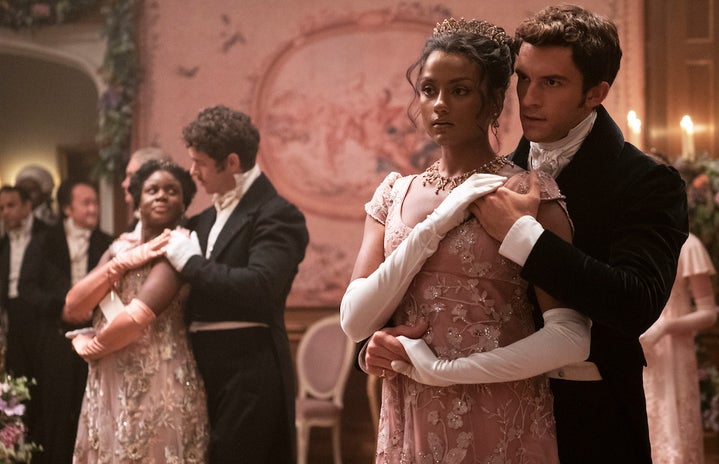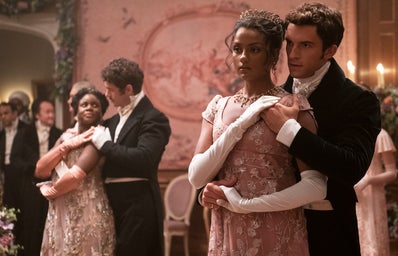While by now we all know Bridgerton Season Two was a resounding success, having amassed over 193 million hours of viewing time in its debut weekend and ranking in Netflix’s top 10 in 93 countries, some fans were somewhat disappointed by what unfolded on their screens. Lovers of the Julia Quinn novels took to the internet upon release––tweeting, commenting and creating TikToks to share the disparities between the beloved novel and the adapted TV show.
Like the second book in the novel series, The Viscount Who Loved Me, season two of the show followed Anthony Bridgerton, the eldest of eight siblings, on his quest to find a wife. But here’s the catch, he’s eliminated what others may find particularly key in a relationship: Love. For him, this is simply a duty he must fulfill, a notion that leads Kate Sharma to find him unfit for her sister Edwina Sharma, the diamond of the season. And so ensues a story of passion, scandal and heartbreak.
While the show’s premise remained the same, the showrunners took significant creative liberties with the plot. The inclusion of a love triangle between Anthony, Kate and Edwina; the reveal of Lady Whistledown as Penelope Featherington, causing the platonic breakup of the century between her and Eloise Bridgerton; the absence of Anthony and Kate’s shared grief over the passing of their respective parents, to name a few.
“As a book reader I am frustrated that they took some of the elements of Anthony and Kate’s story that made it unique (being compromised over a bee sting, misunderstanding and bonding over the death of their parents and the respective terrors they both faced over storms),” one fan tweeted. “These […] were glossed over in the show in order to focus on the tired, standard love triangle trope.”
Why would the producers make changes to a storyline that is already loved by so many expectant fans? Well, that leads to another question: What are the challenges of adapting a book to the screen? As a book lover, it’s common to want to see every moment you’ve read, but there are logistical factors that we may, at times, fail to recognize.
Novels are typically written in first person, with lots of the words on the pages being the thoughts of characters. While voiceovers may be used at times in screen adaptations, it is not an effective way of engaging an audience who want to see and hear the story unfold, this article relays.
To believe the story that’s being told, it’s essential to believe in the world in which the story exists. This means that showrunners have the added responsibilities of producing historically accurate sets, adding music and taking careful note of the hair, makeup and costumes worn. Forming this world and helping the audience visualize it also means expanding on subplots and secondary characters outside of the main protagonists.
“I’m not a terribly visual writer. People have asked, ‘Does it look the way you imagined it?’ And I don’t really have an answer because I didn’t imagine it that well. Now I have this to see—it’s filled out all the empty spots in my imagination, which is really exciting,” said Quinn in an interview with Shondaland.
Showrunners also deserve to exercise some level of creative expression even if they’re using already existing source material. According to director and screenwriter Charles Oliver, film is its own art form and deserves its own treatment. “You can be true to the theme of the book, you can be true to the tone of the book, and you can be true to the characters, but you can’t be true to every single plot point. You kind of have to redefine your own map. You can go through the same journey as the book, but you have to take different steps,” said Oliver in an interview with Deseret News.
While fans of The Viscount Who Loved Me are justified in expecting the stories they fell in love with to be translated accurately onto the screen, the show’s producers are also justified in exploring their creativity and creating a story that surprises both the audience who’s just entered the Bridgerton world and those who were long familiar with it. So, as we await season three with bated breath and our popcorn ready to go, let’s consider this and trust the storytelling process (and hope Polin’s story is just as romantic as we envision!).


